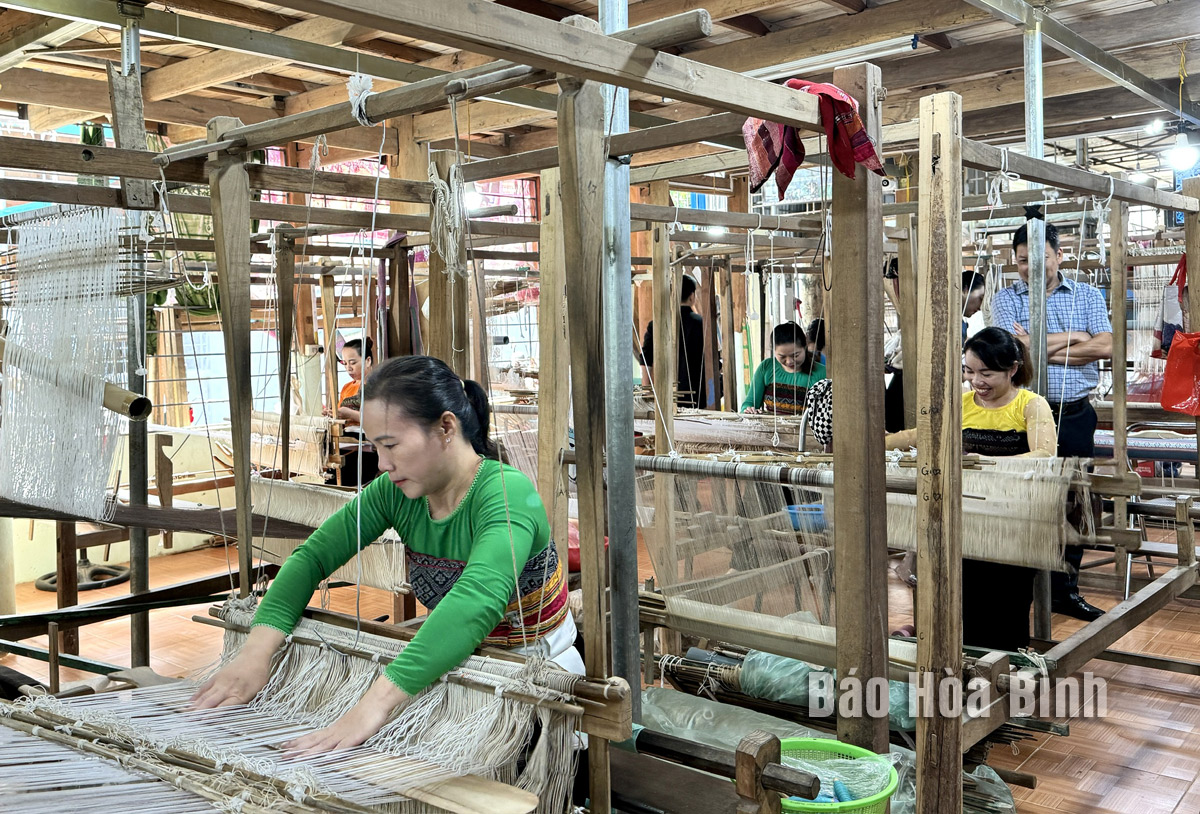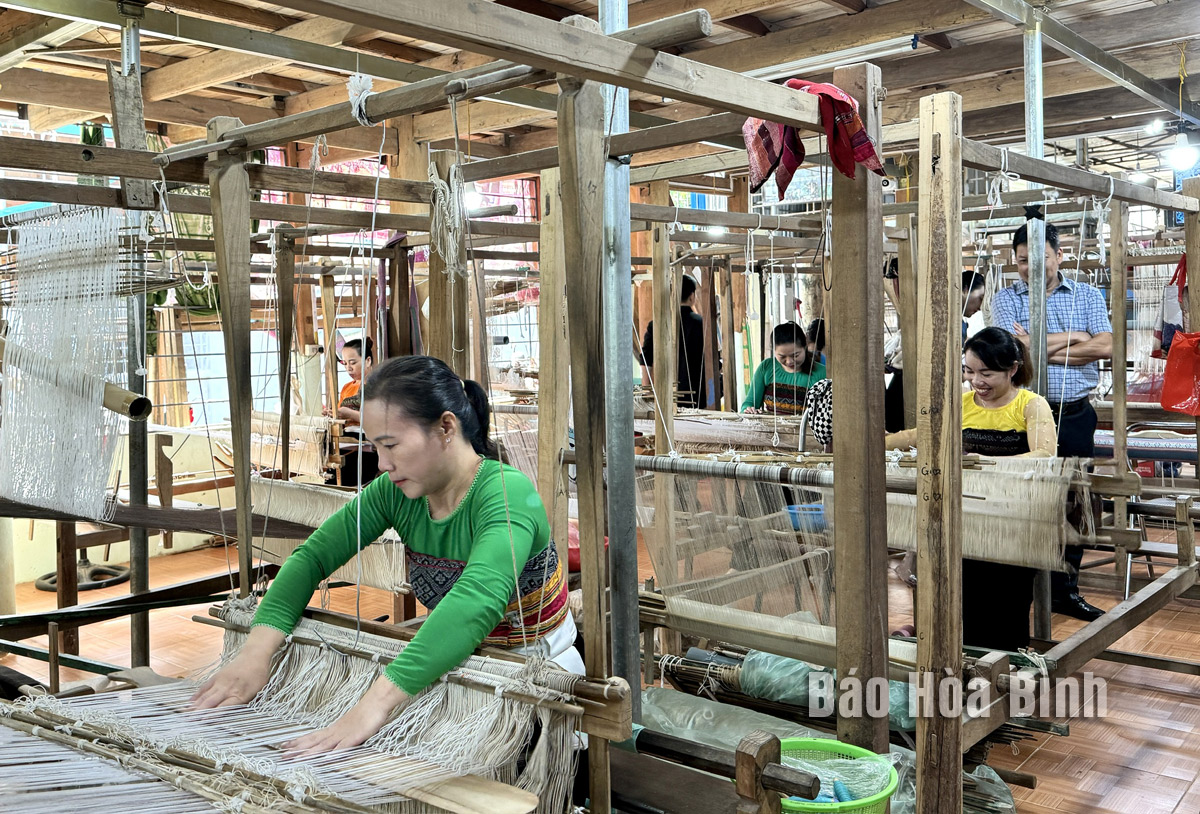
Established in 2013, Chieng Chau Brocade Weaving and Service Cooperative (Chieng Chau Commune, Mai Chau) now has 21 members and around 80 additional employees outside the cooperative working on orders. After overcoming many challenges, the cooperative has gradually asserted its position in the market, providing the stable jobs for many Thai ethnic women in the commune. Recently, with the dedication and determination, these Thai women have continuously innovated and worked hard to preserve their traditional craft, bringing culturally rich products to both domestic and international tourists.
Chieng Chau Brocade Weaving and Service Cooperative (Mai Chau) is committed to preserving the traditional weaving craft and producing the unique and diverse brocade products.
Being the youngest member of the cooperative, Ms. Mac Thi Thanh Mai from Chieng Chau hamlet, is proud to uphold her ethnic group's traditional craft while earning an income to support her life. She says that from a young age, her mother taught her both the techniques and the love for brocade weaving. Thus, when the cooperative was established, she eagerly joined as a member. In the past, most brocade products were made to meet the local demand. Now, with the hometown changing and more tourists visiting Mai Chau, the demand for brocade products as gifts has increased and diversified. At the cooperative, she finds the work she loves, which suits to her health, and she also can preserve her ethnic craft and secure a stable income.
To "keep the fire” of the craft alive and inspire other women to preserve and promote ethnic values through the traditional weaving, the cooperative has researched and diversified the brocade products by incorporating tailoring. Creating the products based on the heritage of the conventional brocade patterns, the cooperative continues to use the natural cotton fabrics and follows the traditional production methods from spinning, and dyeing, to weaving, which require the meticulous effort. Machinery only supports the final stages of product finishing. Previously, brocade was primarily used for blankets, scarves, pillows, and clothes. Today, the cooperative offers a wider range of products to meet the tourists’ demands, including modernized clothing for men and women, handbags, laptop bags, tablecloths, notebook covers, keychains, and home décor items.
To meet the customers’ needs, the cooperative ensures its product prices remain competitive while preserving the distinctive cultural features of Thai ethnic people. The cooperative invests in machinery, technology and labor to improve production efficiency. Currently, it has a workshop of over 300 square meters, 14 sewing machines, and about 50 weaving looms. All products are produced in a closed-loop process, from weaving to sewing and embroidery to the finished products.
In its efforts to expand its market, the cooperative has actively participated in product promotion at trade fairs and commercial programs. Over the years, the cooperative’s products have gradually established a stable market presence. Two of its brocade products have been recognized as OCOP 3-4 star products at the provincial level. In 2023, the cooperative achieved a revenue of over 3 billion VND.
Ms. Vi Thi Oanh, the Deputy Director of the cooperative, says that after 15 years of development, the cooperative's success is due to the support from the local authorities and organizations. With a stable income of 5 million VND per person each month or more, the members and employees have improved their incomes, overcome hardships, and stabilized their lives, while they can also preserve the traditional brocade weaving of their ethnic group. To expand production, the cooperative aims to open more workshops, produce more products, create jobs for women in the commune, and attract new members. However, the cooperative faces the challenges due to a lack of land for construction. Therefore, it hopes for the support from the local leaders and authorities to help the cooperative fulfill its role in collective economic development and the preservation of the traditional crafts.
With an increasingly vibrant and widespread emulation movement aimed at building cultured residential areas and cultured families, Yen Thuy District has been making steady progress toward improving both the material and spiritual well-being of its people, while fostering a civilized, prosperous, beautiful, and progressive community.
Once lacking recreational spaces and community facilities, Residential Group 2 in Quynh Lam Ward (Hoa Binh City) has recently received attention for the construction of a new, spacious, and fully equipped cultural house. The project followed the model of state support combined with public contributions in both labor and funding.
The "All people unite to build cultural life" movement, which has been effectively integrated with Kim Boi district’s socio-economic development goals, is fostering a lively spirit of emulation across local residential areas, hamlets, villages, public agencies, and enterprises. In addition, through the initiative, traditional cultural values are being preserved and promoted, while community solidarity and mutual support in poverty reduction and economic development are being strengthened.
A working delegation of the Hoa Binh provincial People’s Committee led by its Permanent Vice Chairman Nguyen Van Toan on June 11 inspected the progress of a project to build the Mo Muong Cultural Heritage Conservation Space linked to tourism services in Hop Phong commune, Cao Phong district.
Born and growing in the heroic land of Muong Dong, Dinh Thi Kieu Dung, a resident in Bo town of Kim Boi district, in her childhood was nurtured by the sweet lullabies of her grandmother and mother. These melodies deeply imprinted on her soul, becoming an inseparable part of her love for her ethnic group's culture. For over 20 years, this love for her hometown has driven Dung to research, collect, and pass down the cultural values of the Muong people to future generations.
In the final days of May, the Ethnic Art Troupe of Hoa Binh Province organized performances to serve the people in remote, mountainous, and particularly disadvantaged areas within the province. These were not just ordinary artistic shows, but they were the meaningful journeys aimed at spreading cultural values, enhancing the spiritual life of the people and contributing to the preservation of ethnic minority cultural identities.



